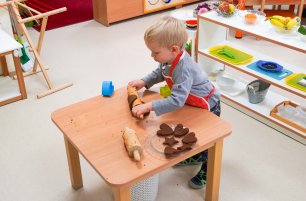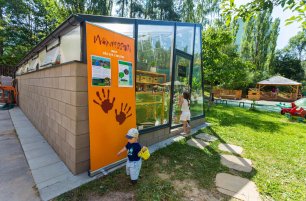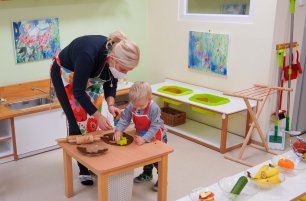Czech and Slovak Leaders Interview with Kateřina Bečková
“I wanted to secure the best possible education for my children”
The story of the International Montessori School of Prague brings together a number of fascinating worldwide trends. The first of these trends is glocalisation – a combination of globalisation and localisation, with the American Montessori Society global accreditation creating a framework, while the school is also adjusted to the Czech environment and conditions. Kateřina Bečková, founder and executive director says: “We have to, and we want to, meet not just the American accreditation standards, but also take into account the Czech environment and its distinctiveness. Children from 27 different nationalities attend IMSP, but half of our children are from the Czech Republic. As such, our curriculum must not just accommodate the European metric system, but also the method of teaching mathematics, for example the method of multiplication and division which is specific to us.”
The second trend I would like to note is that Kateřina is an example of what one could term a “self-made female entrepreneur”. Female entrepreneurs offer something specific. In contrast to men, who focus on doing business in fields which are perceived as economically beneficial such as construction, electronics and IT, women more frequently focus on doing business in social services or small retail. This female type of enterprise is often at a disadvantage in terms of access to funding and technologies, while it is also highly regulated by complex laws.
A third major trend is the issue of leadership and education. At the start of the new school year, the Czech Management Association published a report stating that the Czech Republic could become more competitive if it had more self-confident leaders. The standard Czech education system does not consider working with leaders, despite research which suggests that the key characteristics of future leaders can be developed mainly up until a child’s 10th birthday!
Kateřina Bečková founded the private International Montessori School of Prague in 2002. The spark for doing so was an endeavour to secure high quality education for her own three children. Over 15 years, IMSP has become one of the best schools in the Czech Republic with places for 110 pupils aged from 15 months to 13 years. Today, the school employs 16 full-time teachers and 4 part-time teachers. As well as preschool and school education, IMSP also provides after school play and other clubs. The teaching staff includes specialists in art, Spanish, drama, music, physical education and library science amongst other fields.
Kateřina put her energy, vision and herself into building the school. When you meet her, you would hardly believe that this naturally shy woman is the director of a major educational institution and her mission is to bring an integrated and holistic approach to education to prepare children for the future. Kateřina is one of the greatest Czech experts in education and the Montessori method, having achieved the necessary training while running the school. She originally studied economics, and subsequently completed a master’s degree in Special Education. She has completed the Montessori Leadership programme and continues to learn about leadership in the Czech Republic and abroad.
Kateřina, IMSP celebrated its 15th birthday in spring 2017. How do you look back on this time?
I take stock. As you noted, my kids were my main drive for founding the school. But they’ve already finished school and I am pleased that they are so well prepared for further studies and for life in general. I still love working with kids, which gives me great satisfaction and I am proud of our school and the stable and professional team I have managed to build up. I think we have achieved the optimum in terms of size and operation. I don’t plan to expand the school with additional branches, nor do I want to increase the number of pupils in our classes, or increase the number of classes. I think we have gone through the difficult phase of building up the school, and we have constructed a solid foundation. Now, we want to focus on further increasing quality. We enjoy continuing to work on communication, focusing on increased effectiveness, and achieving sustainable results. I think that this kind of work is a great reward for me. Most recently, we have been focusing on defining a new mission, the values linked with that mission, and how to put them into practice.
What are you most proud of in relation with IMSP?
Of all the accreditations we have achieved, because we are the only American Montessori Society fully accredited school in Europe. Our most recent accreditations, both American and Czech, gave us top marks. The fact we are full to capacity demonstrates our quality and popularity. I couldn’t achieve that alone; I rely on a stable, professional team of accredited colleagues. I am also proud of our premises; our school has a large garden over 4000 m2 in size next to a wood. We have an aviary in the garden, fruit bushes and trees and a vegetable patch, and looking after our plants and animals is an integral part of our teaching. Last but not least, we are successfully building a community of parents and school advocates who are spreading Montessori education principles further throughout Czech society.
There remains great interest in Montessori in the Czech Republic. The method is suitable not just for children, but also for older people. In July this year, Prague hosted the International Montessori Congress. For those who didn’t take part, it was a prestigious event which takes place once every four years, with 2000 participants and more than 100 experts from around the world visiting the Prague congress. What makes Montessori different?
It’s important to realise that the Montessori method is not just about tools, but above all about the approach. One pitfall here is the fact that the Montessori method is not a copyrighted patent so, often, schools purchase the tools and immediately put “Montessori method” into their name. The Montessori method is about the philosophy and putting it into practice, about the ability of the teacher to manage to work with both the whole class and with individuals and about seeing the unique potential of each child. The tools themselves are secondary. Another challenge is the fact that many Czechs advocate traditional educational methods and it is difficult for them to entirely trust a new approach based on free choice. There is a general prejudice that the Montessori method means chaos, but actually the opposite is true. We have to work to balance the expectations and boundaries while offering free choice.
IMSP is a leader in bringing new trends to education. Which trends do you think are fundamental?
I think there are three fundamental trends: recognising your own unique talent, the ability to cooperate and a love for education. When interacting with children, we focus on holistic child development, helping them to grasp and also express their uniqueness. We teach children not just to solve problems, but also to cooperate effectively. Today, individual development and assertion is often stressed, but without interaction and effective cooperation with other individuals you cannot do anything on your own in society. Montessori is based on the principle of “help me to do it myself” from an early age. Even the youngest children take part in cleaning and tidying and the preparation of snacks; they are much more independent in communication, and also hygiene habits and the ability to look after themselves compared to their peers. We focus on the different components of intelligence – social intelligence, emotional intelligence, bodily/kinaesthetic intelligence and moral intelligence. We work with four key values – respect, consideration, responsibility and kindness, and we place great stress on overall integrity. Last but not least, we make appropriate use of technology which is going to play an even greater role in education.
How do you see yourself as a leader?
We use the Talent Dynamic profile tests at school, meaning we build on the natural talent of individuals, not on acquired skills. Using this approach, my profile is “Trader,” and my leadership is based on long-term relationships, care for others and building a community. My approach is to undertake individual actions together with a team. People can rely on me; my door is always open both to my team and to parents. And now I’m learning to delegate more; I want to focus more on strategic decisions and spend less time on day-to-day operations. As I said, I’m looking forward to sharing everything we have managed to build with the wider community which we are helping to build.
What advice do you have for parents of school children in relation to the start of the new school year?
I’m an advocate of good routines which can save time and energy. Take enough time to sleep and then for your morning, your breakfast, journey, so you aren’t stressed every morning. Trust your school and children and make enough time for them. Especially at the beginning, don’t just speak to your children, but also the teachers and school management. You are our partners and we are here for you.
What are your plans and vision for the future?
My mission is to bring a holistic approach to education in which every child can express their uniqueness. Specifically, I am trying to bring the above discussed Montessori methods of education to our country so that we can truly activate the uniqueness of each one of us. I have already spoken about the community of parents and advocates we are building, and we are preparing a series of educational workshops for them. We want to focus more on working with our youngest children, where we see the greatest potential. We want to provide parents with a detailed guide for creating a Montessori home environment. And, of course, we will continue to evaluate and improve all our approaches within our holistic approach to education. One of the problems of Czech education is not just its focus on knowledge, but also how rigid it is.
By Linda Štucbartová
Want to learn more? Read our next article:




